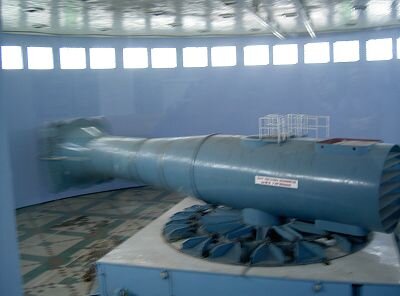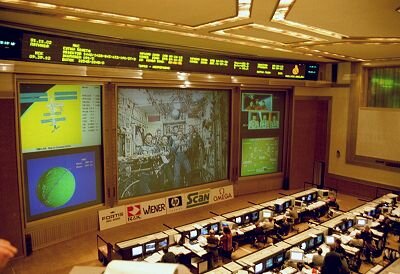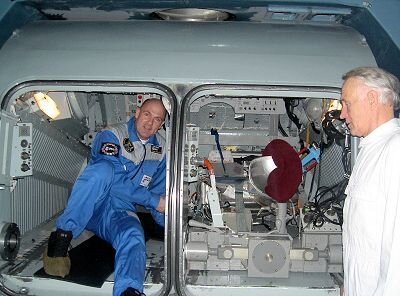André Kuipers' diary - Part 15: Press visit, TsUP and exams
18 - 24 March Now that my flight is getting closer, journalists naturally want to talk to me. That was why the Dutch press visited Star City last week. There were journalists from newspapers and magazines, radio broadcasters and also TV crews from NOS, RTL and SBS6.
On Wednesday, we all dined together at the National Hotel in Moscow and on Thursday we met up at the cosmonaut training centre. I was just cycling to work, when all of a sudden a whole group of photographers were awaiting me around the corner. They asked me to go back and cycle up again because it made such a good shot.

Interviews
I showed them the spacesuit and took my place in the Soyuz simulator. One by one, journalists came to interview me and take photos. The newspaper and magazine press were even able to get in next to me and feel what it is like to sit in a spacecraft. I always really enjoy explaining how space travel works and how you train for a space mission as an astronaut. Sometimes there is simply not enough time, but this time everyone was pretty satisfied. It does feel rather strange to have so many visitors, with TV equipment and all, but never to see anything of it yourself. I used to follow all the news about space missions avidly, but now I am going in person there is just not enough time any more. Also, a lot of interesting talks are being given in the Netherlands about the DELTA Mission, and at one time I would definitely have attended these. I feel as if I am missing out on a lot of things...

On Friday, I went to TsUP, the mission control centre in the Moscow suburb of Korolev. That is where the people work who control our flight and also set the schedule for our work. I discussed this schedule with them on a minute-by minute basis, covering everything that will happen in the Soyuz and on board the Space Station. The definite day for landing has also been announced. I am coming back to Earth on 30 April instead of the twenty-ninth. We will then land on the 'terminator', the borderline between day and night. This means that it will be dark at first on our return journey, and the Sun will rise just as we land.
Music
I spent the weekend with my girlfriend. At the same time, I still had to get all kinds of things ready, such as the music that I want to take up with me. I had to take all my discs in for checking. Naturally enough, the Russians want to check that the discs contain no computer viruses that could disrupt the Space Station.
Music is very important to me, especially in combination with the view. Then I can just daydream and enjoy everything. Not just in space, by the way; I do the same on Earth. In the mountains, or visiting ancient ruins where nobody else is about... then I listen to the powerful, swelling music: glorious!

I had exams on Monday and Tuesday. On Monday, I performed the laser range measurement that I would have to do if the radar system malfunctions as we approach the Space Station. We had only just begun a simulation when the equipment failed. I thought it was a test, just like the ones I have often had before. But then I had a good look around and noticed that a cable had come lose. The instructors had not planned this event. I plugged it in again and we were able to carry on. As you can see, real problems can arise even in simulations.
Computer game
The exam in the centrifuge followed on Tuesday. In there, you have to pay close attention to how you simulate landing a Soyuz spacecraft. If you get something wrong, you either find more G-force bearing down on you – in reality this can amount to up to eight times the Earth's gravity – or you land too far from the expected landing site. Fortunately, everything went well. Better still, I made the best landing of my entire training course and got an 'excellent' mark five times in a row. For me, it is just like a computer game. You try to get the highest possible score. The only difference is that you are really being thrown about.

After the exams, we had a 'standard day in the Space Station' on Wednesday. That involved us doing everything, for an entire day, that we would do as a crew up there. For me, this meant carrying out a lot of experiments. In the morning, I was busy with the 'amateur radio', then I ran through the procedures for the educational activity VIDEO-3 and collected bacteria from all over the Space Station using cotton buds. After lunch, I did the Eye Tracking Device (ETD) experiment. This involves measuring the interaction of the eyes with the internal balance mechanism. I had just finished this when (of course) something went wrong. After all, it was a training exercise. We had all laid bets on whether it would be pressure loss or a fire. It was pressure loss.
Leak
At a time like that, you have to check the Soyuz first; if the leak is not there, you have to comb through the entire Space Station. You always keep the Soyuz behind you, because that is your lifeboat. In an emergency, you have to be able to use it to evacuate the Space Station. The leak turned out to be at the coupling between the Russian modules, Zvezda and Zarya – a very awkward place. We had to seal off the Zvezda, because there is no Soyuz attached to it. The Zvezda, or Service Module, is the main section of the Station, with all the monitoring and air purification equipment, plus the water and the toilet. Carrying on without a service module is pretty difficult, and in the end we abandoned the ISS.
Next week, we will do another simulation in the Space Station and the day after we will have a whole day in the Soyuz. These will not be training exercises but the main exams. I feel confident that we, as a crew, will also pass this final test with flying colours. After that, before all the official ceremonies begin, we will have a big party and a short holiday. This is known as 'crew rest': three days in which we do not have to think of work at all and can relax after an extremely hectic period.




